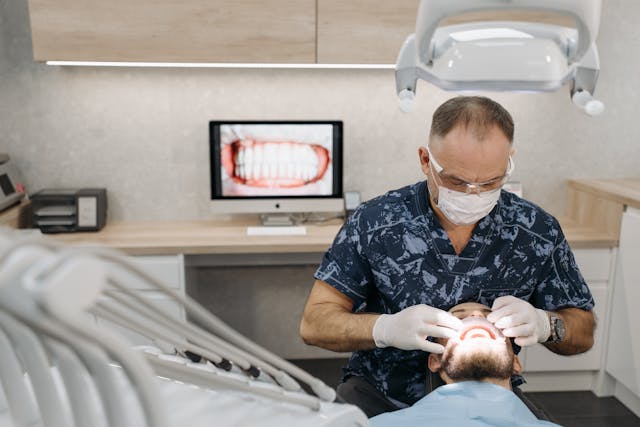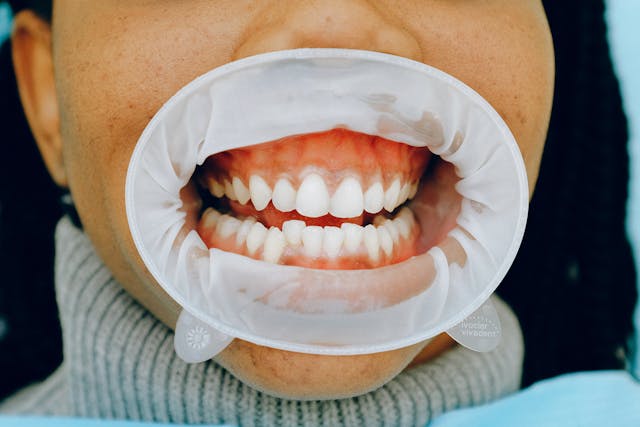Introduction
Stress is a common part of life that everyone experiences at some point. While it’s widely known that stress can affect your mental, oral health, and physical well-being, many people don’t realize the significant impact it can have on oral health. From grinding your teeth in your sleep to neglecting your daily oral care routine, stress can lead to a variety of dental problems. Maintaining good oral hygiene is crucial, especially during stressful times, to prevent serious dental issues. This article explores how stress impacts oral health and provides practical tips for managing it effectively.
At Diamond Dental Care, we offer a variety of solutions to address most aesthetic concerns. During your visit, we’ll perform a thorough examination, take X-rays, and discuss your desired timeframe before presenting you and your parents with several treatment options. Given that some treatments may require specific timeframes, it’s advisable to book your appointment with us as soon as possible.
To schedule an appointment, simply call us at (909) 860-7579. You can also connect with us on Facebook or share your feedback on Yelp. Thank you!
Understanding Stress: A Brief Overview
Stress is the body’s natural response to any demand or challenge. It can stem from various sources, such as work pressure, personal relationships, financial worries, or health issues. When stress becomes chronic, it can have a detrimental effect on both physical and mental health. Recognizing the causes and effects of stress is the first step in managing it and minimizing its impact on your well-being.
How Stress Affects the Body
When you are stressed, your body goes into “fight or flight” mode, releasing hormones like adrenaline and cortisol. These hormones prepare your body to deal with immediate threats but can cause harm when produced over a long period. Chronic stress can lead to symptoms like headaches, fatigue, muscle tension, and digestive problems. It also affects your mental health, causing anxiety, depression, and sleep disturbances.
The Connection Between Stress and Oral Health
Stress not only affects the body and mind but also takes a toll on oral health. High levels of stress can weaken the immune system, making the mouth more vulnerable to infections. Studies have shown that stress is linked to a variety of oral health problems, such as gum disease, dry mouth, and teeth grinding. This connection highlights the importance of managing stress to maintain good oral health.
Common Oral Health Problems Caused by Stress
Teeth Grinding and Clenching (Bruxism)
Bruxism, or teeth grinding and clenching, is one of the most common oral health issues related to stress. Many people grind their teeth unconsciously, often while sleeping. This habit can wear down the teeth, cause jaw pain, and lead to headaches. If left untreated, bruxism can result in severe dental damage and temporomandibular joint disorders (TMJ).
Gum Disease: A Silent Culprit
Stress is a known risk factor for gum disease, which includes gingivitis (inflammation of the gums) and periodontitis (severe gum infection that damages the soft tissue and bone supporting the teeth). Chronic stress weakens the immune system, making it harder for the body to fight off infections. This can lead to inflamed gums, bleeding, and eventually tooth loss if not properly managed.
Dry Mouth and Its Effects
Stress can cause a decrease in saliva production, leading to dry mouth, also known as xerostomia. Saliva is essential for neutralizing acids produced by bacteria in the mouth, washing away food particles, and preventing tooth decay. A dry mouth creates a favorable environment for bacteria growth, increasing the risk of cavities and bad breath.
Canker Sores and Cold Sores
Canker sores are small, painful ulcers that appear inside the mouth, while cold sores are fluid-filled blisters usually found on the lips. Both can be triggered by stress. While canker sores are not contagious, cold sores are caused by the herpes simplex virus and can spread through close contact. Managing stress levels can help reduce the frequency and severity of these sores.
Jaw Pain and Temporomandibular Joint Disorder (TMJ)
Stress often causes people to clench their jaw or grind their teeth, leading to jaw pain and TMJ disorders. TMJ is a condition that affects the temporomandibular joint, which connects the jaw to the skull. Symptoms include pain around the jaw, difficulty chewing, and a clicking sound when moving the jaw. TMJ can be managed with stress reduction techniques and dental interventions.
The Role of Cortisol in Oral Health
Cortisol is a hormone released during stress. While it helps the body respond to stress, high levels of cortisol over time can have negative effects on oral health. Elevated cortisol levels reduce the immune system’s ability to fight off infections, making the gums more susceptible to inflammation and disease. Managing stress is crucial to keeping cortisol levels in check and maintaining healthy gums.
Stress and Oral Hygiene Habits
When life gets stressful, daily routines often suffer. People under stress may neglect their oral hygiene, skipping brushing and flossing or indulging in sugary snacks. This neglect can lead to the rapid development of cavities, plaque buildup, and gum disease. Maintaining a consistent oral care routine, even during stressful times, is essential to prevent these problems.
Effective Ways to Manage Stress
Managing stress effectively is key to protecting your oral and overall health. Techniques such as meditation, deep breathing exercises, and physical activities like yoga or running can help reduce stress levels. A balanced diet rich in fruits, vegetables, and whole grains provides the necessary nutrients to support a healthy immune system. Additionally, ensuring you get enough sleep each night helps your body recover and cope with stress.

Tips for Maintaining Good Oral Health Despite Stress
- Regular Dental Check-Ups: Visit your dentist regularly for check-ups and cleanings. They can detect early signs of stress-related dental problems and provide treatment.
- Proper Brushing and Flossing: Brush your teeth at least twice a day and floss daily to remove plaque and food particles.
- Stay Hydrated: Drink plenty of water to keep your mouth moist and help wash away food particles and bacteria.
- Use Stress-Relief Products: Consider using a mouthguard if you grind your teeth at night, and use fluoride toothpaste to strengthen your teeth.
- Avoid Sugary Foods and Drinks: Stress can lead to cravings for sugary snacks, which increases the risk of cavities. Opt for healthier options like fruits, nuts, or yogurt.
Diamond Dental Care: Your Partner in Oral Health
Located at 303 South Diamond Bar Blvd, Ste 2C, Diamond Bar, CA 91765, Diamond Dental Care is dedicated to helping you maintain optimal oral health. Our team of experienced dentists offers a range of services, including routine cleanings, gum disease treatment, and custom mouthguards for bruxism. We understand the impact stress can have on your oral health and provide personalized care to address your specific needs. Contact us today to schedule an appointment and take the first step toward a healthier smile.
Conclusion
Stress is an inevitable part of life, but its impact on your oral health shouldn’t be ignored. By understanding the connection between stress and dental issues, you can take proactive steps to protect your smile. Implementing effective stress management techniques and maintaining good oral hygiene are crucial. Regular visits to your dentist, such as those at Diamond Dental Care, can help detect and treat stress-related dental problems early on. Remember, a healthy mind and body start with a healthy smile.
FAQs
- How does stress directly affect oral health?
Stress can lead to habits like teeth grinding and clenching, increase the risk of gum disease by weakening the immune system, and cause dry mouth, all of which negatively impact oral health. - Can stress-induced oral problems be reversed?
Many stress-induced oral problems, such as gum inflammation and minor enamel wear from grinding, can be treated and managed with proper dental care and stress management. - What are the signs that stress is affecting my oral health?
Common signs include frequent headaches, jaw pain, mouth sores, bleeding gums, dry mouth, and sensitivity in the teeth. - How often should I visit the dentist if I’m under a lot of stress?
It’s recommended to visit the dentist every six months, but if you’re under a lot of stress and notice symptoms, consider more frequent check-ups to monitor your oral health. - Are there specific dental products that help with stress-related oral issues?
Yes, using a mouthguard can protect against teeth grinding, fluoride toothpaste can strengthen teeth, and mouthwashes designed for dry mouth can help maintain oral moisture.



